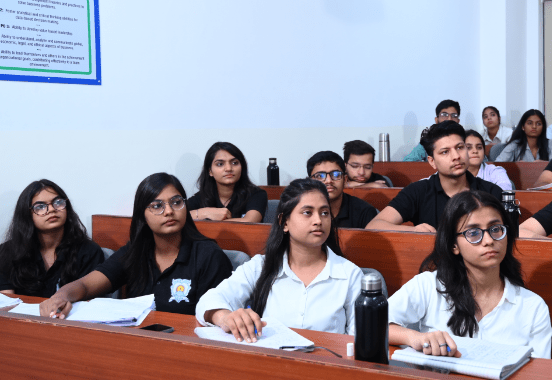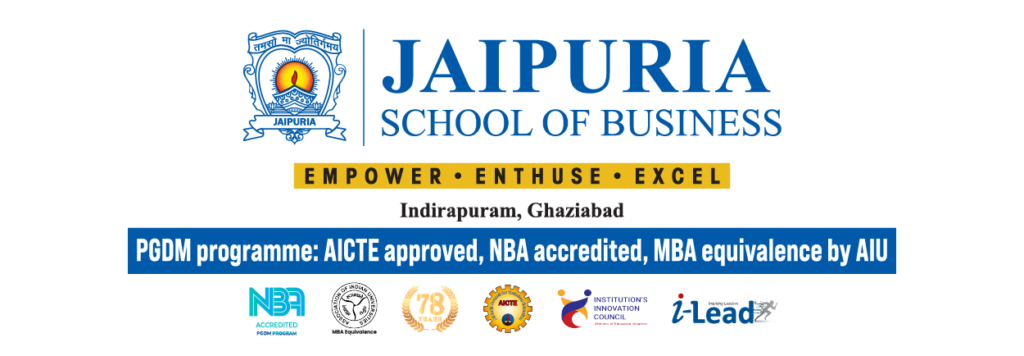A world of difference in a single program

"PGDM at JSB: Transforming Aspirations into Leadership"
Duration: Two-year full time
Recognition: AICTE Approved | NBA Accredited | AIU Recognized PGDM as Equivalent to MBA
The PGDM program at Jaipuria School of Business (JSB) is designed to shape future business leaders by fostering innovation, strategic thinking, and leadership excellence. This two-year full-time program integrates academic rigor with industry relevance to prepare students for dynamic business environments.
Program Structure & Specializations
Spanning six trimesters, each lasting 11-12 weeks, the PGDM programme brings business leadership to the classroom with instilling qualities of employability & corporate Readiness in students. The programme blends foundation and elective courses tailored to contemporary business needs and individual aspirations.
Why Choose JSB’s PGDM?
The vision of crafting tomorrow’s business leaders is bolstered by the following elements:
Dual Specialization – Choose from Business Analytics, Marketing, Finance, Operations, Human Resources, International Business and Tourism & Hospitality.
Industry Readiness Courses– A seamless blend of theory and practice, tailored for real- world challenges. It encompasses the Ability Enhancement Module, Pre-Placement Training, Individual Development Plan (IDP), General & Corporate Awareness, along with Industry Visits and Live Projects for hands-on learning.
Holistic Transformation- JSB nurtures leaders with a high Spiritual Quotient (SQ), professionalism, and strong work ethics, fostering social empathy through initiatives like the Rural Immersion Program, shaping ethical and compassionate change-makers.
Experiential Learning – Gain practical experience through Case Studies, Simulation workshop Capstone projects, Summer Internships, and Live Projects, bridging academia with real-world business challenges.
Strong Corporate Connect – Engage with industry through Practitioner Sessions, I-Lead Sessions, Expert Talks, Alumni Interactions, and Mentorship Programs, fostering real-world insights and professional growth.
Workshops and Industry Certifications- Enhance expertise through Industry Certifications and specialized workshops, equipping students with in-demand skills for a competitive edge in the corporate world.
Pre-Term Orientation
Its aims to ready students from diverse academic and social backgrounds and bring them on the same platform and complete the prerequisites to connect seamlessly in the regular classes.

Outcome-based Education
The outcome-based approach to designing courses at JSB intends to make the expectations more transparent for students, any regulatory or accrediting body and all stakeholders. Instead of the instructor deciding the syllabus, this approach starts with a specification of what the student is expected to achieve by the end of the program/course.
These learning outcomes could be knowledge acquisition, mastery of skills, or development of attitude or ability. These outcomes will be specified in publicly shared statements in a clear way, along with the assessment criteria by which they will be measured. The programme is then written; complete with assessments designed to test the criteria in a way that it facilitates students to work towards achieving the stated outcomes.
The PGDM Programme has clearly defined Program Outcomes which have been carefully drafted to ensure that they include subject-specific skills and generic skills, including transferable global skills and competencies.
The Programme Outcomes (POs) focus on knowledge and skills that prepare students for further study, employment and citizenship. Within the framework of Outcome-based Education, the three most important learning methods used by JSB faculty are:
Case Based Learning (CBL) is generally a decision-making or problem-solving exercise. The actual data and information of an organization are given to students along with information about the decision-makers and others. Students are then required to identify the issues or problems and analyze the given information to solve the problem and make a recommendation. In CBL, students are highly involved in classroom learning.
Problem Based Learning (PBL) is an unstructured or semi-structured real-world problem. Unlike the case studies where information is already available, students take the responsibility of identifying the problem, getting essential information, resources, etc., and thus the learning takes place. Teachers and even participants themselves become facilitators/mentors/guides.
Project Based Learning requires students to work on a complex problem/question for an extended period of time. Projects are focused on student learning outcomes and may involve field work.

Value Added Courses / Certifications
Its aims to ready students from diverse academic and social backgrounds and bring them on the same platform and complete the prerequisites to connect seamlessly in the regular classes.

